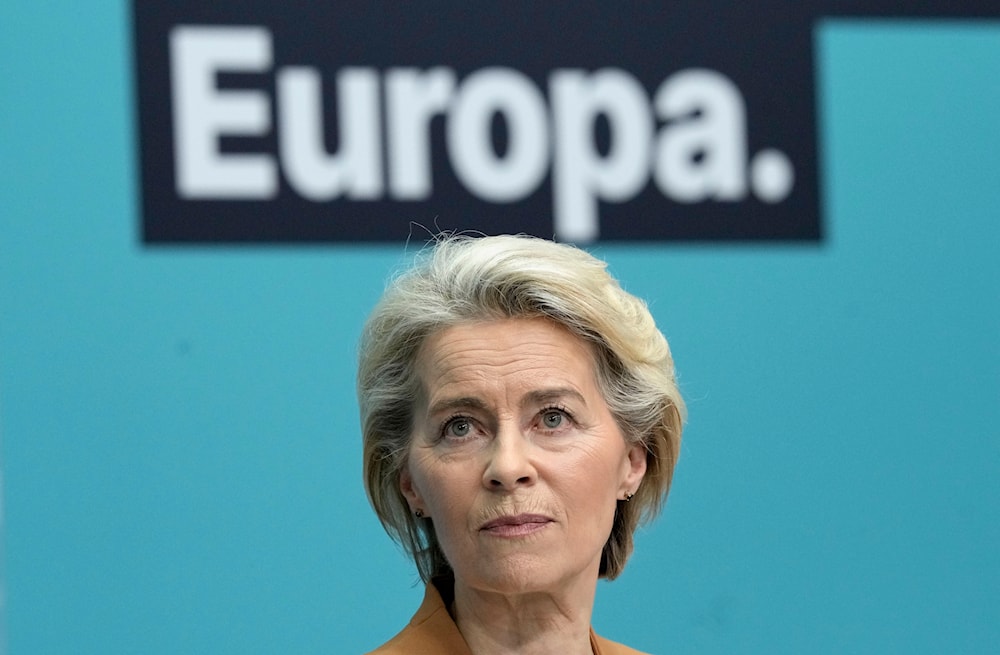What targets did EU's 13th anti-Russia sanctions package aim at?
This set of sanctions is aimed at restricting Russia's access to military might, with a total of 194 individual designations, including 106 individuals and 88 entities affected by the package.
-

Ursula von der Leyen, president of the European Commission, listens to the media during a press conference in Berlin, Germany, Monday, Feb. 19, 2024. (AP)
The EU has confirmed the adoption of a 13th package of sanctions against Russia, on the second anniversary of the war in Ukraine.
This set of sanctions is aimed at restricting Russia's military might, with a total of 194 individual designations, including 106 individuals - including the Russian Defense Minister - and 88 entities affected by the package.
Over 140 companies and individuals from the Russian military-industrial complex, which manufacture missiles, drones, anti-aircraft missile systems, military vehicles, and high-tech components are targeted by the sanctions.
Electronic transformers, static converters, and inductors found inter alia in drones, alongside aluminum capacitors for military use are also banned.
Every single euro that Russia is not getting hold of, is a gain. Therefore, there is no room for complacency.
— European Commission (@EU_Commission) February 23, 2024
We welcome today's agreement by the @EUCouncil to adopt a new package of sanctions against Russia.#StandWithUkraine
Among those affected are 10 Russian companies and individuals that the EU alleges are shipping North Korean weapons to Russia, several Belarusian companies and individuals allegedly supporting the Russian Armed Forces, and a Russian logistics company and its director allegedly involved in imports of banned goods to Russia,
'Degrading Putin's war machine'
The new additions in the package are 6 judges and 10 officials from the accessioned territories of Ukraine, with 15 individuals and 2 entities involved in the alleged deportation and the military indoctrination of Ukrainian children, including in Belarus.
The EU document, describing the package, states that "based on hard evidence from various sources" and "supported by trade and customs data," 27 Russian and third-country companies associated with Russia's military-industrial complex are sanctioned.
The list of partner countries in the indirect iron and steel import ban now includes the United Kingdom.
17 Russian companies linked to the development, production, and supply of electronic components for Russia's military are included as well, alongside 4 companies from China and one each from Kazakhstan, India, Serbia, Thailand, Sri Lanka, and Turkey for "trading in electronic components for Russia's military and industrial complex."
In response, China's Foreign Ministry spokesperson Mao Ning affirmed that her country will take the appropriate and necessary measures to protect Chinese firms against possible sanctions.
"China will continue to take necessary measures to resolutely protect the legitimate rights and interests of Chinese enterprises," Mao said.
The 13th package is not different from its precedents. At least 200 individuals have been sanctioned and banned from traveling to the EU, and individual and business assets will also be frozen.
"With 2,000 listings in total, we keep the pressure high on the Kremlin. We are also further cutting Russia’s access to drones," European Commission President Ursula von der Leyen said on X, in a post calling for the "degrading" of Russia.
I welcome the agreement on our 13th sanctions package against Russia
— Ursula von der Leyen (@vonderleyen) February 21, 2024
⁰We must keep degrading Putin's war machine.
⁰With 2000 listings in total, we keep the pressure high on the Kremlin.
⁰We are also further cutting Russia’s access to drones. https://t.co/AfSxsEUB8x

 3 Min Read
3 Min Read









